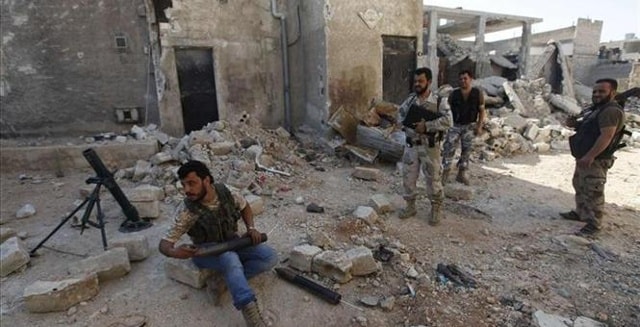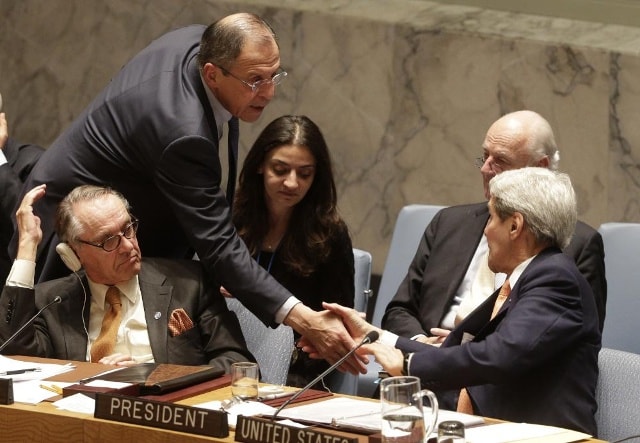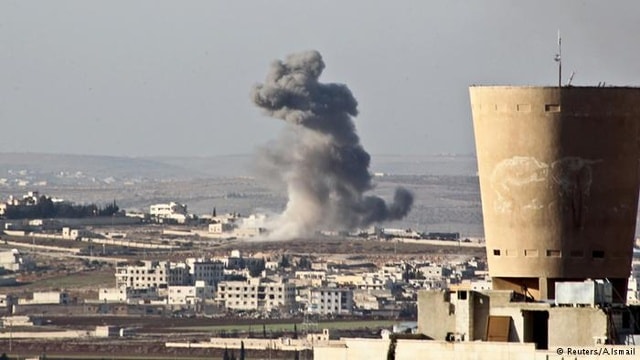Aleppo front - the key point of the Syrian war
(Baonghean) - Almost all the conflicts and problems of the war that has lasted for more than 5 years in Syria may soon be resolved on the Aleppo front. The presence of all forces and levers participating in this war is pushing the situation here to an unprecedentedly complex and fierce situation.
Full of talent
It is no coincidence that over the weekend, Türkiye repeatedly fired artillery across the border at targets mainly Kurdish forces in Aleppo province, northern Syria. It is not that Türkiye has never had any intention of intervening in the civil war in its neighbor, but choosing this moment to push forward with a military adventure is entirely forced by circumstances.
 |
| The northern front in Syria, especially in Aleppo city, will decide the way out of the war that has lasted for more than 6 years in Syria. Photo: Townhall.com |
That’s because Turkey is worried about the slow but steady advances of pro-Syrian government forces in Aleppo. Earlier this month, with the help of Russia and Iran, the Syrian army cut off the road connecting Aleppo province to the Turkish border, known as the Azaz corridor.
In fact, Russian aircraft have been continuing their airstrikes in Aleppo for months. On the ground, Iraqi and Hezbollah fighters, assisted by Iranian advisers, are achieving certain results on the battlefield.
On the other side, the Syrian rebels, backed by the US, Türkiye, Saudi Arabia, and Qatar, are struggling to fend off attacks from forces loyal to President Bashar al-Assad. These rebel and opposition groups are considered “famous”, including extremist organizations linked to the al-Qaeda network such as the Nusra Front, or Ahram al-Sham.
The Kurds, who are allied with both Russia and the United States, are also taking advantage of this chaotic time to expand their “territory”, while the self-proclaimed Islamic State (IS) terrorists are still entrenched in some small villages.
Türkiye’s involvement in the February 13-14 shelling comes as it fears that once the Bashar al-Assad regime clears the rebel areas along the border, Kurdish forces will quickly replace them. The Syrian Kurdish People’s Protection Units (YPG) have taken advantage of US and Russian airstrikes to expand their strongholds in eastern Syria and now Aleppo.
 |
| The roles of the two superpowers Russia and the US will continue to influence the future of peace in this Middle Eastern country. Photo: Inquirer |
The threat posed by the Kurdistan Workers’ Party (PKK), a political faction that Ankara has designated as a terrorist organization, is not far-fetched. If the Syrian Kurds control the territory, it could create a breakaway state across the borders of Syria, Turkey, and even Iraq in the Middle East. That is why Ankara has been quick to mobilize its forces, vowing to continue its offensive until the YPG withdraws from the border area.
Syria’s so-called “Stalingrad” battlefield has seen a full range of combatants and forms of warfare. In addition to ground combat along the border corridor with Türkiye, Syrian forces are also facing densely populated areas where the effectiveness of heavy weapons is reduced and the risk of casualties skyrocket. Therefore, the Syrian government army and its allies are probably considering a plan to gradually tighten the siege to achieve the goal of retaking this important northern stronghold.
The course of the battlefield will decide the game.
Although the UN Security Council passed a draft resolution submitted by the US and Russia last December to promote the political process in Syria, not many people believe that such a resolution can create positive movement for the civil war in Syria.
 |
| The Aleppo front is entering its most fierce phase. Photo: Washington Post |
Debka Intelligence Network believes that a political solution for Syria will depend largely on developments on the battlefield, especially in northern Syria, where there is involvement of outside forces. Meanwhile, the political future of President Bashar al-Assad will no longer be a decisive factor.
This assessment is well-founded because the peace plan does not consider ending the civil war that has lasted for more than 4 years in Syria or forcing President Assad to step down. It is only a premise to explain Russia's expanding involvement in Syria.
In addition, just one day before the UNSC passed the draft resolution, the US on December 17 withdrew all 12 F-15 fighters deployed at Incirlik Air Base in Türkiye just one month earlier. This action occurred at the time when Russia deployed modern Buk-M2 air defense missiles to Syria, forcing the Pentagon to stop airstrikes in northern Syria.
The above two moves show that the US has withdrawn its military resources in the fight against IS in Syria, leaving Russia to dominate the game in Syria. Without US support, it is difficult to say that the rebel forces in Syria have enough confidence and resources to step up the counter-attack and regain territory.
Once air support is in Russia’s hands, it will be an important factor in deciding the ground war, where the situation is still unclear. The Syrian government army and its allies have a clear advantage. And once this force can take control of the battlefield, repelling rebel and terrorist groups, then public opinion can be sure that the political transition process towards ending the Syrian civil war will make progress./.
Thanh Son
| RELATED NEWS |
|---|
